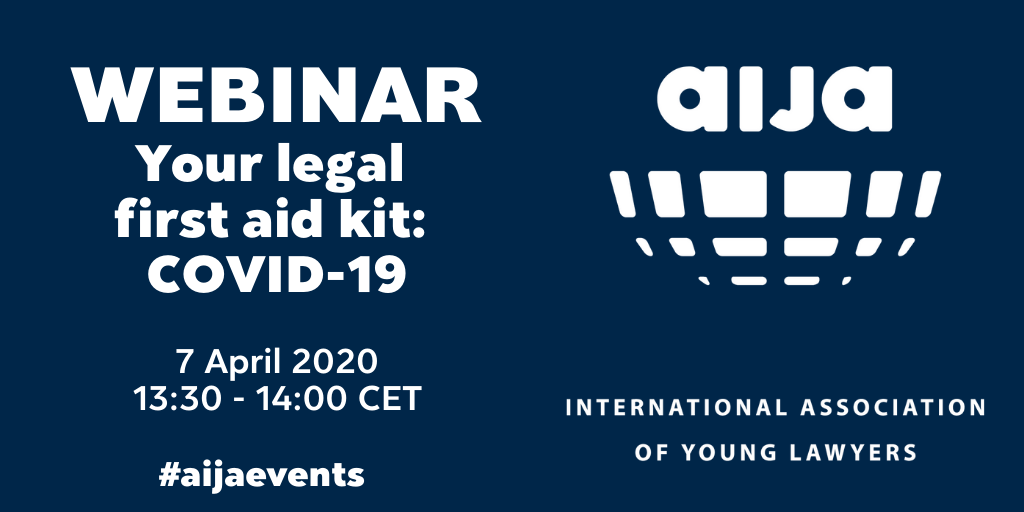 On 7 April, AIJA hosted its first webinar in response to the challenges ushered in by COVID-19. Both external and in-house counsel perspectives have been shared during this 30-minute event as well as new ideas and tools for your legal first aid kit.
On 7 April, AIJA hosted its first webinar in response to the challenges ushered in by COVID-19. Both external and in-house counsel perspectives have been shared during this 30-minute event as well as new ideas and tools for your legal first aid kit.
Undoubtedly, the crisis brought challenges but also a series of opportunities. This webinar was the ideal moment for speakers from different jurisdictions to share their first weeks’ experience dealing with the COVID-19 crisis and map out some of the opportunities that they had already identified. These insightful discussions have sparked many questions that directly affect clients’ business and legal professionals.
Key Takeaways from the webinar’s speakers:
Marco Gardino, R&P Legal - Studio Associato, Italy:
“Some national legislations had to adapt in order to remove certain corporate formalities, allowing shareholders and board of directors’ meetings via digital means”, and “companies will have to be very careful about managing the approval process of annual financial statements and decisions on whether or not to distribute profits accrued before the outbreak of the virus”.
Anda Mize, European Lingerie Group, Latvia:
“We have been lucky that our company is already a very digital one, mostly due to our footprint, as the management team is spread throughout various European countries. In terms of working remotely, the current restrictions do not present a significant change-up for us. With companies, law firms, and authorities alike becoming more digital, more efficient and focused, I believe that this will be one of the positive takeaways from this situation.
Arguably, the most difficult aspect of this crisis is that we do not know how long it is going to last, and hence, how to appropriately gear up for the future. Surely, law firms and companies alike can relate to this.
What I personally appreciate from our external counsel is that they keep calm and carry on, adjust, react, and just stay focused on the issues at hand. It is also interesting and useful to hear their insights and suggestions on how to go about this undoubtedly unique crisis, as external counsel work with clients in different industries and jurisdictions and have hence seen more issues, solutions, and do’s and don’ts than I have as an in-house lawyer in my specific company/industry.”
.jpg) Alessandro Paci, R&P Legal - Studio Associato, Italy:
Alessandro Paci, R&P Legal - Studio Associato, Italy:
“Many clients are not aware that force majeure clauses may include notice requirements and time limits. Some clauses also require to provide force majeure certificates from qualified authorities; however, not all countries’ authorities issue certificates. In any case, it may be questionable if a certificate would be recognised in the country of performance. In the weeks ahead, it is imperative that new contracts contain optimised force majeure clauses and also specific Covid-19 provisions.”
Eric Johnson, Advokatfirman Cederquist, Sweden:
“Albeit unlikely to be force majeure, a drastic decline in revenue may be considered hardship, i.e. situations where the commercial balance has been severely impacted due to external unforeseen circumstances, and one of the contracting parties is suffering major losses whilst the other stands more or less unaffected. Now, hardship clauses – as opposed to force majeure clauses – do not release the suffering party from its performance obligations, but they would give the party a right to have the contract renegotiated (at least in part). If there is no hardship clause in the contract, it is probably very difficult in most jurisdictions to unilaterally impose amended terms. Looking ahead, consider including renegotiation clauses in your contracts, and/or terms that will allow you to push back payment dates for a certain period of time, in case of extraordinary external circumstances.”
Max Mailliet, Etude Max Mailliet, Luxembourg:
"These are interesting but also challenging times for lawyers. In many countries, the rules change daily, today’s truth is tomorrow’s lie. We have to move quickly, anticipate changes and, most of all, keep our synthetic thinking at the same time. We are also stuck somewhere between our client’s best interests and our ethical rules, some of which ask us to uphold the general best interest.”
Thank you to the speakers for their contribution. Check out for other AIJA online events here